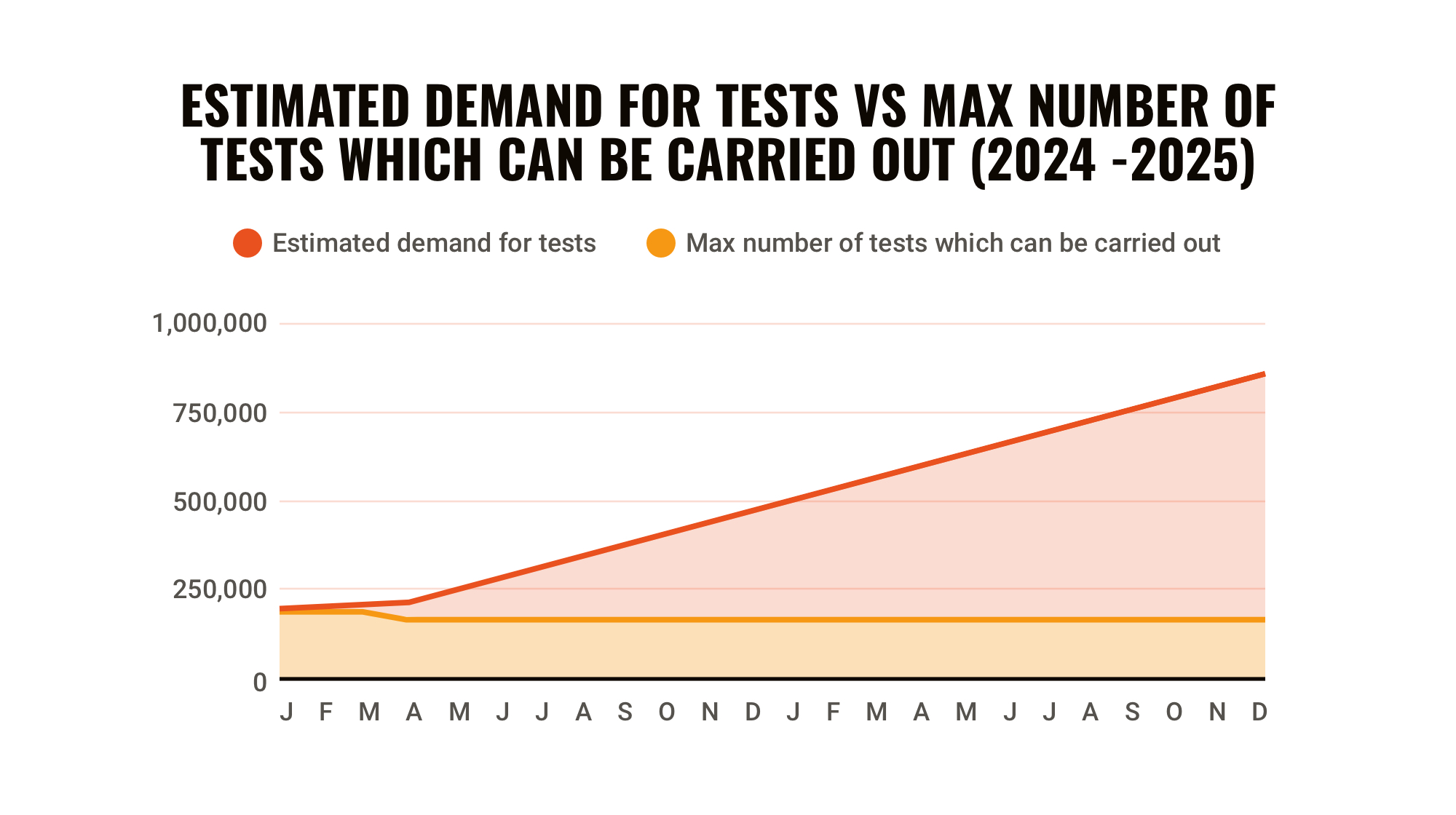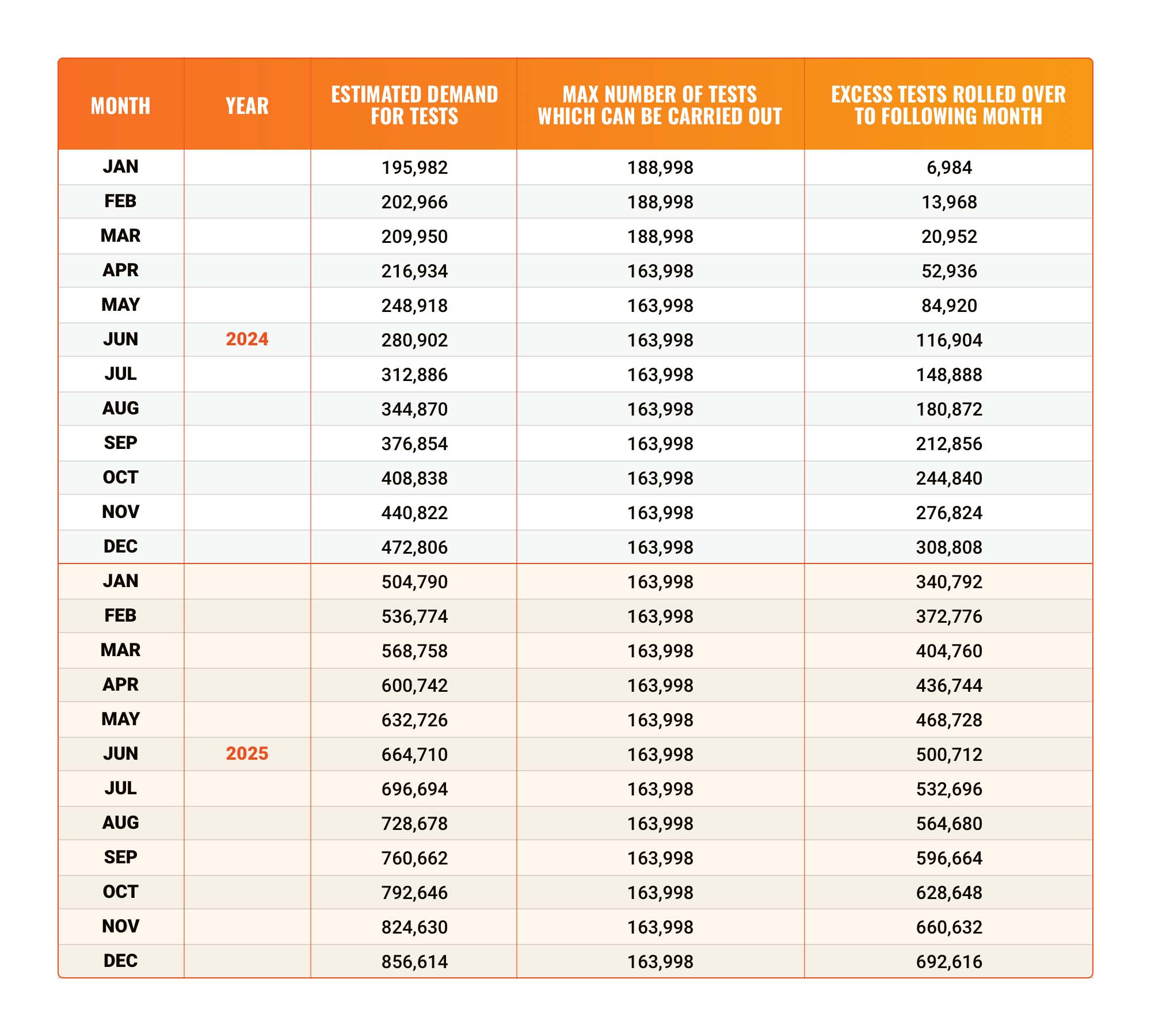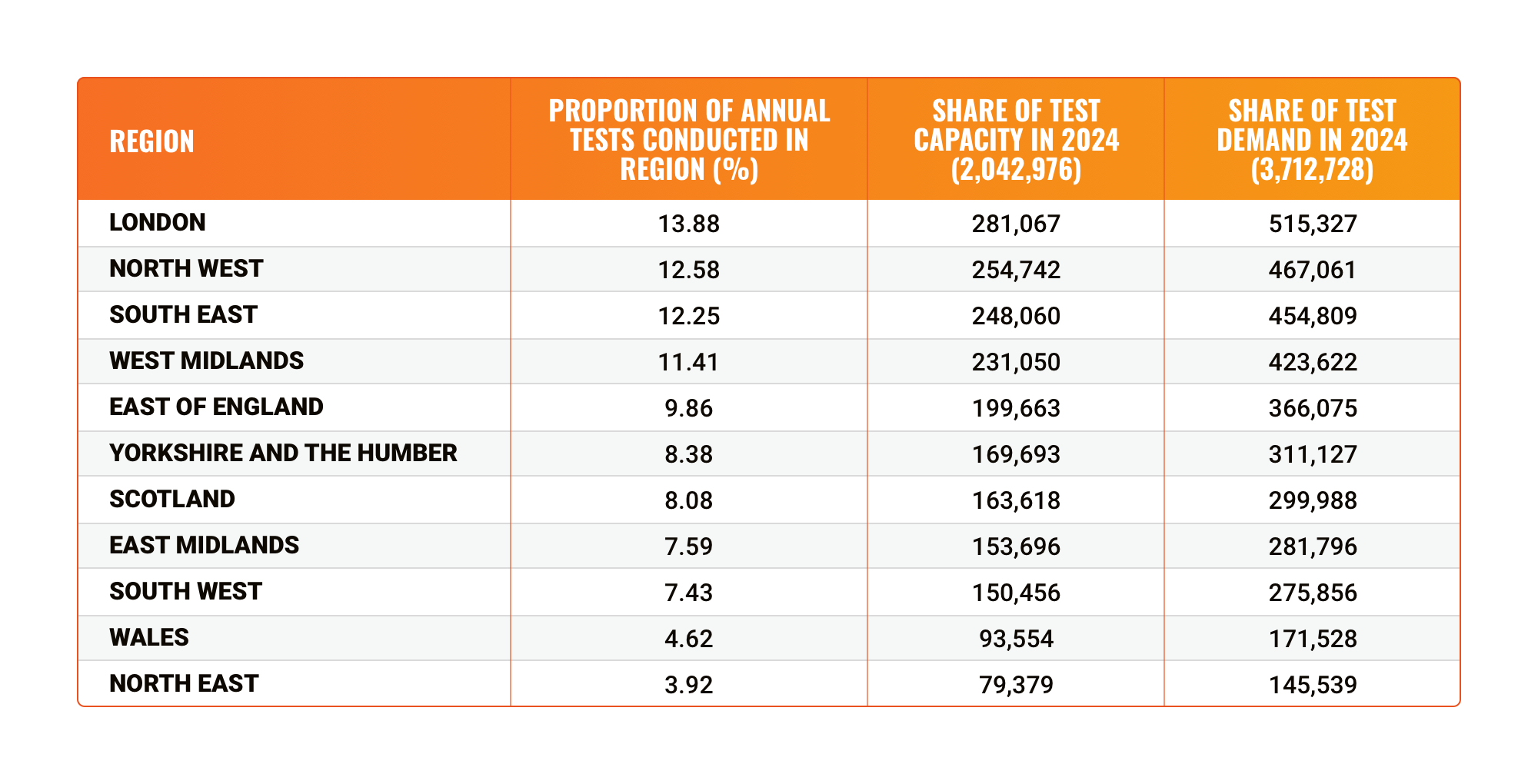This resource is updated annually with new data and predictions. This ensures that the predictions we’re making are accurate and consistently reveal the scale of the driving test backlog across the UK. We can keep a track of how the backlog is progressing and what this means for learners.
The scale of the driving test backlog has been well-documented since the pandemic which increased the scale of the waiting list for driving tests. But, the backlog was bubbling way before the pandemic, with COVID-19 only accelerating the issue.
Back in 2020, we calculated that there weren't enough driving instructors to meet demand and at the end of 2021 based on the data we had, we estimated that the backlog would clear by January 2024. But a lot has changed since then…
We wanted to rerun the same analysis with up-to-date data that is also in line with changes made by the Driver and Vehicle Standards Agency (DVSA) in an attempt to increase test numbers, which include:
- A campaign to recruit additional examiners which will help deliver a significant number of extra tests compared to normal, pre-Covid levels
- Conducting out-of-hours testing such as at weekends and on public holidays
- Buying back leave from driving examiners
- Offering overtime and annual leave buy back to driving examiners
- Asking all those qualified to conduct tests, but who do not do so as part of their current day job, to return to conducting tests
- Inviting recently retired examiners to conduct tests
- Most recently, announcing 150,000 new test slots between October 2023 & March 2024 which we have also taken into account within our data - distributing the number over six months.
The wait for driving tests continues to be a specific point of frustration for learners and as we’ve seen in our previous research, this will cost them as they aim to remain test-ready.
We’ve found demand far outweighs supply when it comes to driving tests
An overall theme from our findings is that demand drastically outweighs supply. For this year (2024) alone, we estimate more than three million learners will battle for a driving test (including retests), with the DVSA only able to accommodate an average of 170,248**** per month in 2024, leaving a huge rollover for 2025.
As of 2nd January 2024 and confirmed through a Freedom of Information request (FOI) to the DVSA, there are *556,895 tests already booked for the first six months of 2024, around half of what we estimate can be accommodated within the same period.
We submitted a further FOI to the DVSA to ask for data on gross demand for tests from Jan’23 - Dec’23. The data suggested that on average, there is an average gross demand of **195,982 tests per month.
So even without a rollover of tests month by month, fundamentally, monthly gross demand (195,982), outweighs the monthly capacity to conduct the tests (163,998***) by 19.5% - an issue that we predict will compound every month until capacity for testing can match the demand.
Our data has also started afresh from January 2024, however, we believe that based on mid-year analysis in 2023, there would have been a rollover of 820,087 tests from 2023. For the purposes of this updated view of the landscape, we’ve opted not to include that number - even with that number omitted, the outcome remains the same in terms of the long-term picture.
Demand for driving tests in 2024 will exceed capacity by 82%
From January, there were already 195,072 tests booked as of 2nd January 2024, confirmed by the DVSA. From our analysis of monthly gross demand, we expect there to be further demand in January of 910 tests leaving an overall demand of 195,982 tests. Given the max capacity for testing is 188,998 in January, this leaves a rollover of 6,984. At this point, the backlog could be controlled but it’s set to quickly snowball out of control as the year progresses.
From April, the additional test slots announced by the DVSA will have been filled and the rollover of tests from the first few months of the year will sit at 20,952, on top of our predicted demand of 195,982 tests.
This trend continues throughout the year. Given capacity for testing is lower than gross demand, when the rollover figures combine a compound effect begins and we see based on our forecast that this backlog is unlikely to end unless testing capacity can start to meet gross demand.
We estimate there to be 3,712,728 learners competing for a test in 2024, with the DVSA only able to accommodate 2,042,976 of them, meaning demand exceeds capacity by 82%.

In 2024 alone, the rollover of tests will reach a high of 308,808 by the end of December.
Here’s how 2024 & 2025 look for the backlog:

What does the backlog look like where you are?
Our data also reveals the extent of the backlog regionally across the UK based on where tests are being conducted.
We’ve found the proportional region split of tests being carried out. By viewing the estimated demand for tests across the whole year (3,712,728), and breaking that number down by proportion of tests conducted in that area in 2023, we’re able to see what the demand looks like in 2024 in regions across the UK.

In an email from the DVSA, chief executive of the agency, Loveday Ryder said:
“We are taking all the measures we can to reduce driving test waiting times. The work we've been doing to date, along with our examiner recruitment, is already creating over 40,000 extra tests every month. We strongly urge learners only to book their driving test when they are ready to pass.”
The DVSA says the average waiting time for tests is 17.4 weeks as of December’23 with tests released on a weekly basis, 24 weeks in advance. It says demand for tests remains high due to:
- An increase in demand
- Sustained industrial action on civil service pay
- People’s concerns about not being able to book a test, which has led to a change in customers’ behaviour
What do the experts say?
We spoke to driving instructor Mark Steeples from Pass Mark School of Driving.
We put the data to Mark to get his thoughts and perspective and to also gauge his advice to learners facing the backlog right now. Here’s what he had to say:
“I don’t see a situation arising where we’re pre-COVID testing levels. The driving test backlog has a knock-on impact on those wanting to learn, I’m flooded with enquiries as people currently have an insatiable desire to learn how to drive and they’ll do it by hook or crook. But, because we can’t get people through to their test, we’re struggling to squeeze people into our books and so the cycle continues.
“As much as the DVLA doesn't want instructors and learners using driving test apps to get a slot, what more can you do? What choice do you have? We have to use them as we can get earlier dates. If learners need to pass for work or university, then they have to, it’s a self-perpetuating problem.
“I’ve had some learners part-way through learning that have ran out of money due to the delay or have failed and then when faced with another lengthy wait have just decided to stop driving completely.”
“This backlog is undoubtedly impacting driving standards, I unequivocally believe that. I’ve seen a general decline in the standard of driving over the past few years and that has been fuelled by the ongoing backlog.
“To stem the backlog, we need more examiners and they need a better incentive to join. Examiners are likely to remain as instructors because it’s more appealing, it pays better - this problem can’t be solved on a budget. More test centres would be great, but without people to fill them, what’s the point? There’s only so much that instructors can do!”
When asked what advice he’d give to learners, here’s what Mark said:
“My advice to learners is if you’ve done your theory, get your test booked now, but only take it if you’re confident and ready to pass based on the advice of your instructor, and be prepared to reschedule it if you’re not fully ready; I have sometimes had to make this judgement call with my learners. I know I can teach most competent learners within 25 hours. If you know you’re going to start your driving lessons soon, then get them booked in. I’d advise learners to book in with an instructor to start learning how to drive at least 9 months to 1 year before, not two weeks before as we often see, that just isn’t going to work.”
The knock-on impact of the backlog:
In August 2022, our research asked learner drivers what their biggest frustrations were when it came to facing a delay for a driving test and it’s unsurprising to see that 77% said that the extra cost of additional lessons and other associated learning costs, was the biggest knock-on effect of the backlog. In second, 71% said having to rely on friends and family to drive was their biggest irritation, while 68% said the delay in securing independence and freedom was having the largest impact on them.
What you can do to stay test ready if you’re impacted by the backlog
To help and provide some actionable tips for those impacted by the backlog, we’ve teamed up with award-winning driving instructor, Jeff Tuck, to ensure learner drivers are as prepared as possible - here’s our top advice:
Practice on the roads around where you plan to take your test
It’s of course impossible to guess the route that your test will take, but your instructor should have a good idea of the routes that are taken on tests. Be sure to ask them about practising on these routes so that you can become familiar with them ahead of your test. You can even do this in your own time on a parent, or friend’s car, you will just need to make sure your supervising driver is over the age of 21, they have the right learner driver insurance for you to drive their car and have held a full UK licence for at least three years.
Embrace the mock test
It’s important to be prepared for the process so that you know what to expect. The more practice you can get from the testing process, the better! You may find that elements of the test become more familiar and your confidence improves. Mock tests are great for this and can ensure that you feel on track for your real test!
Know your manoeuvres like the back of your hand
Practice, practice, practice! Know the steps, know the process and put this all to use in your car. If you’re confident with the stages then you’re halfway there. Be confident in asking your instructor for more focus on manoeuvres, even if it takes a whole lesson. If you can do this in the car you’ll be taking your test in, that’s even better as you can understand its size and dimensions ahead of whatever is thrown at you in the practical.
Methodology
The Data
- *Following an FOI request in Jan 2024 to the DVSA, we established all tests booked, as of 02/01/24.
- **An FOI request in Jan 2024 revealed gross demand for driving tests from Jan 2023 - Dec 2023. Using the data, Marmalade has established an average gross monthly demand for driving tests. This figure will include retests, as well as first-time tests. Between January’24 - June’24 we already had data for tests booked that month as of 02/01/24. So for those months, we have only factored in the remaining number once already booked tests were deducted from the avg gross demand.
- Both ‘*’ and ‘**’ come together to create an ‘estimated demand for tests’.
- ***Marmalade sourced available data from the ONS around driving tests conducted between Sept’22 & Sept‘23 to establish an average monthly capacity for testing across the UK.
- This data provides us with the ‘max number of tests which can be carried out’.
- ****For the year 2024, we have included an additional capacity for 25,000 tests for Jan, Feb & March (this accounts for half of the 150,000 tests announced by the DVSA between Oct’23-March’24)
Calculating the backlog
- To establish the scale of the backlog, we took bookings already made in 2024 and plotted these by month booked, we then added these to the gross monthly average number taken from gross demand for tests in 2023. We then subtracted the ‘max capacity for testing’. Any excess tests were rolled over to the next month where these were taken into account in the same calculation as before. We then subtracted the ‘max capacity for testing’ again. The process continued until there were no excess tests or until the backlog showed no signs of ending.
- All original data can be found here - https://docs.google.com/spreadsheets/d/10fs64jXUQkWrD80VIHtsvdFawbw6I3jjSATFaR8qHKA/edit#gid=1563355049




